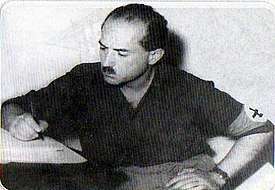Davud Monshizadeh
| Davud Monshizadeh | |
|---|---|
 | |
| Born |
29 August 1915 Tehran, Persia |
| Died |
1989 (aged 73–74) Uppsala, Sweden |
| Alma mater | Berlin University |
| Occupation | Professor of Iranian Languages |
| Political party | SUMKA |
| Military career | |
| Allegiance |
|
| Service/ | Schutzstaffel |
| Battles/wars | |
Davud Monshizadeh (Davoud Monchi-Zadeh) (Persian: داوود منشیزاده; 29 August 1915 in Tehran – 13 July 1989 in Uppsala, Sweden) was the founder of SUMKA (the "Iranian National Socialist Workers Party") and a supporter of Nazi ideology in Germany during World War II and in Iran after the war. He was also a scholar in Iranian Studies who later became a Professor of Iranian Languages at Uppsala University, Sweden.
Career
Monshizadeh is mainly remembered for his contributions to Iranian linguistics, particularly to the study of Modern and Middle Iranian languages. However, he also led an active political life in Iran and abroad.
Monshizadeh formed SUMKA in 1952.[1] He had lived in Nazi Germany since 1937, and was a former SS member, who fought and was wounded in the Battle of Berlin. He was also a professor at Ludwig Maximilians University of Munich and was deeply influenced by Jose Ortega y Gasset's philosophy, even translating many of his books (which he hoped would serve as founding principles for the party), from Spanish to Persian. He returned to Iran in 1950. Monshizadeh would later serve as a Professor of Persian Studies at Alexandria University and Uppsala University. Monshizadeh was known as an admirer of Hitler and imitated many of the ways of the Nazi Party (such as their militarism and salute), as well as attempting to approximate Hitler's physical appearance, including his moustache.
Chronology
- 1931 - Sent to France by Iranian government to study
- 1937 - Moved to Germany, a year after the Hitler Cabinet declared Iranians to be "pure-blooded Aryans" and immune to all Nuremberg laws, thus making them capable of becoming Reich citizens.[2][3][4]
- 1939 - Monshizadeh and Bahram Shahrokh (the future Iranian Propaganda Director) started working for the Persian program of Nazi Germany’s Deutsche Radio.
- 1940 - He started writing articles for Das Reich, the official newspaper of the German National Socialist party
- 1941 - He worked with various organizations in Nazi Germany
- 1943 - Obtained his doctorate in philosophy and literature from Berlin University[5]
- 1945 - During the Battle of Berlin, he fought as a member of the SS. He was injured and hospitalized (off and on) till 1947.
- 1947 - Taught Iranology and Persian language in University of Munich
- 1950 - He returned to Iran
- 1951 - Along with Manouchehr Amir Mokri and Hussein Zarabi, he established the Iranian National Socialist Party (Sumka),[6] which played a role against oil nationalization in Iran.
- 1953 - Monshizadeh was “Unofficially Exiled” to Europe by Shah Mohammad Reza Pahlavi.
- 1963 - He left Iran in 1963 and spent the rest of his life in Sweden. Taught Iranology and Persian language in Uppsala University, eventually becoming Professor in Iranian Languages.
- 1989 - He died in Uppsala, Sweden.
References
- ↑ Dabashi, Hamid (2015). Persophilia: Persian Culture on the Global Scene. Harvard University Press. p. 106. ISBN 9780674504691.
- ↑ Asgharzadeh, Alireza (2007). "Iran and the Challenge of Diversity: Islamic Fundamentalism, Aryanist Racism, and Democratic Struggles". Palgrave Macmillan., p. 92.
- ↑ Iran’s Unholy Alliance with Hitler Enshrined in a Name
- ↑ The Iran Documents P.2 World News Research
- ↑ Rahnema, Ali (November 2014). Behind the 1953 Coup in Iran: Thugs, Turncoats, Soldiers, and Spooks. Cambridge University Press. ISBN 9781107076068. Retrieved 5 March 2015.
- ↑ Rahnema, Ali (November 2014). Behind the 1953 Coup in Iran: Thugs, Turncoats, Soldiers, and Spooks. Cambridge University Press. ISBN 9781107076068. Retrieved 5 March 2015.